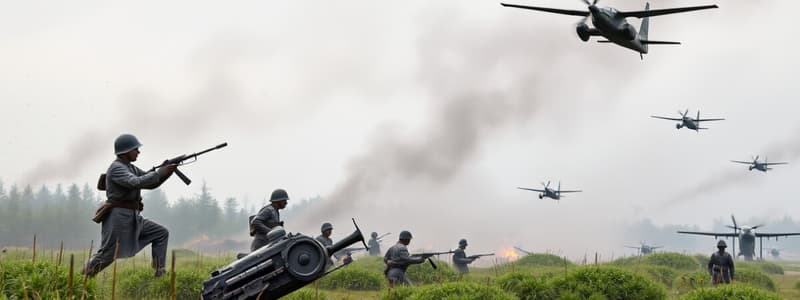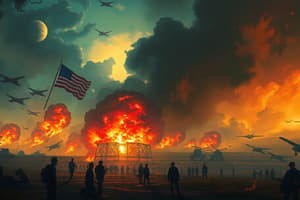Podcast
Questions and Answers
The period of global conflict from 1939 to 1945 is known as World War II.
The period of global conflict from 1939 to 1945 is known as World War II.
True (A)
The Treaty of Versailles was signed in 1945.
The Treaty of Versailles was signed in 1945.
False (B)
Nazi Germany, Fascist Italy, and Imperial Japan formed the Allied powers in World War II.
Nazi Germany, Fascist Italy, and Imperial Japan formed the Allied powers in World War II.
False (B)
The attack on Pearl Harbor in 1941 led to the United States entering World War II.
The attack on Pearl Harbor in 1941 led to the United States entering World War II.
D-Day refers to the Allied invasion of Normandy in 1944.
D-Day refers to the Allied invasion of Normandy in 1944.
The Holocaust refers to the industrialization of warfare during World War II.
The Holocaust refers to the industrialization of warfare during World War II.
The estimated fatalities from World War II are between 200-300 million.
The estimated fatalities from World War II are between 200-300 million.
The establishment of the United Nations occurred in 1945.
The establishment of the United Nations occurred in 1945.
Flashcards
World War II
World War II
Global conflict from 1939 to 1945, involving most of the world's nations.
Treaty of Versailles
Treaty of Versailles
A treaty that imposed harsh penalties on Germany after WWI, contributing to resentment and instability.
Axis Powers
Axis Powers
Germany, Italy, and Japan
Allied Powers
Allied Powers
Signup and view all the flashcards
Start of WWII
Start of WWII
Signup and view all the flashcards
Pearl Harbor
Pearl Harbor
Signup and view all the flashcards
D-Day
D-Day
Signup and view all the flashcards
The Holocaust
The Holocaust
Signup and view all the flashcards
Study Notes
Overview
- Global conflict from 1939 to 1945.
- Involved most of the world's nations, divided into Allies and Axis powers.
Causes
- Treaty of Versailles (1919) and its harsh penalties on Germany.
- Rise of totalitarian regimes (Nazi Germany, Fascist Italy, Imperial Japan).
- Expansionist policies of Axis powers.
- Economic instability due to the Great Depression.
Key Players
- Allies:
- United States
- Soviet Union
- United Kingdom
- China
- France (Free French Forces)
- Axis:
- Germany
- Italy
- Japan
Major Events
-
Invasion of Poland (1939):
- Marks the start of WWII; Germany invades Poland, leading to British and French declarations of war.
-
Battle of Britain (1940):
- Air campaign by Germany against the UK; British Royal Air Force successfully defends the country.
-
Operation Barbarossa (1941):
- Nazi Germany invades the Soviet Union; opens the Eastern Front.
-
Pearl Harbor (1941):
- Japanese attack on US naval base; leads to the US entering the war.
-
D-Day (1944):
- Allied invasion of Normandy; significant turning point in the war in Europe.
-
Atomic Bombings (1945):
- US drops atomic bombs on Hiroshima and Nagasaki; leads to Japan's surrender.
Outcomes
- Estimated 70-85 million fatalities.
- Establishment of the United Nations in 1945 to promote peace.
- Division of Europe into Eastern and Western blocs (Cold War).
- Decolonization movements in Asia and Africa.
- War crimes trials (Nuremberg Trials).
Key Concepts
-
Total War:
- Mobilization of entire nations, impacting civilians and economies.
-
Holocaust:
- Systematic genocide of six million Jews and millions of others, including Romani people and disabled individuals.
-
War Technology:
- Advances in weaponry, including tanks, aircraft, and nuclear weapons.
Legacy
- Shift in global power dynamics; emergence of the US and USSR as superpowers.
- Redrawing of national boundaries and establishment of new countries.
- Continued impact on international relations and military strategies.
Overview
- Global conflict from 1939 to 1945 involving most nations worldwide.
- Two major alliances: Allies and Axis powers.
Causes
- Treaty of Versailles imposed severe penalties on Germany, fostering resentment.
- Rise of totalitarian regimes such as Nazi Germany, Fascist Italy, and Imperial Japan.
- Expansionist policies pursued by Axis powers threatened neighboring nations.
- Economic instability stemming from the Great Depression increased political turmoil.
Key Players
- Allies:
- United States
- Soviet Union
- United Kingdom
- China
- France (Free French Forces)
- Axis:
- Germany
- Italy
- Japan
Major Events
- Invasion of Poland (1939):
- Initiated WWII; German invasion prompted Britain and France to declare war.
- Battle of Britain (1940):
- Germany launched an aerial campaign; British Royal Air Force’s defense was crucial in thwarting invasion plans.
- Operation Barbarossa (1941):
- Nazi Germany’s invasion of the Soviet Union, marking the beginning of the Eastern Front conflict.
- Pearl Harbor (1941):
- Surprise attack by Japan on a U.S. naval base, catalyzing U.S. entry into WWII.
- D-Day (1944):
- Allied forces’ invasion of Normandy; a pivotal moment leading to the liberation of Western Europe.
- Atomic Bombings (1945):
- U.S. bombings of Hiroshima and Nagasaki resulted in Japan's unconditional surrender.
Outcomes
- Estimated 70-85 million fatalities, making it one of the deadliest conflicts in history.
- Formation of the United Nations in 1945 to encourage global peace and cooperation.
- Division of Europe into Eastern and Western blocs, setting the stage for the Cold War.
- Surge in decolonization movements across Asia and Africa following the war.
- War crimes trials, notably the Nuremberg Trials, held to prosecute prominent leaders.
Key Concepts
- Total War:
- Full mobilization of nations, significantly affecting civilian populations and economies.
- Holocaust:
- Systematic genocide resulting in the deaths of six million Jews and millions of others, including Romani people and the disabled.
- War Technology:
- Significant advancements in weaponry including tanks, aircraft, and the development of nuclear weapons.
Legacy
- Transformation of global power dynamics, establishing the U.S. and USSR as predominant superpowers.
- Alteration of national boundaries and the formation of new countries after the war.
- Lasting impacts on international relations, military strategies, and global politics.
Studying That Suits You
Use AI to generate personalized quizzes and flashcards to suit your learning preferences.




